| Photos | Description | Price |
| MILITARY MEDALS & MILITARY RELATED ITEMS circa 1800 to recent. With a particular emphasis on naval history related items.
TO
PLACE AN ORDER:
Reserve your items by sending an email to
oldcoins@senet.com.au
or telephone, Midday
to 6pm AEST - Monday to Friday,
08
81653446 to
confirm your purchase.
If necessary, leave
a phone message and a time to call and you will be answered.
|
Aust |

 | GB. 1805 Battle of Trafalgar. GEORGE III, Boulton's Trafalgar
Medal, 1805, in white metal (48mm), by C.H.K(uchler), reverse inscribed,
'W.Malkinson/H.M.S Polyphemus' (BHM 584, Eimer 960). In a case and
fitted with a wide ring mount with glass cover on obverse and reverse,
the mount fitted with a loop and bar suspender with blue ribbon fitted,
fine, Ex Fred Scarffe Collection. SD313
Landsman William Malkinson HMS Polyphemus is confirmed as serving
during the Battle of Trafalgar. He was born in 1767 at Horncastle,
Lincolnshire, England, and the next ship he served onboard was the HMS
Leyden. He was perhaps the son of John Malkinson (1737-1822) and
Bridgett Trout (1740-1825) HMS Polyphemus was a 64-gun third-rate ship of the line and took part in
the Battle of Trafalger with two men killed and four wounded. She
engaged the French ships Neptune and Achille and captured Argonauta.
After the battle she towed HMS Victory, carrying Lord Nelson's body,
back to Gibraltar. | $950 |

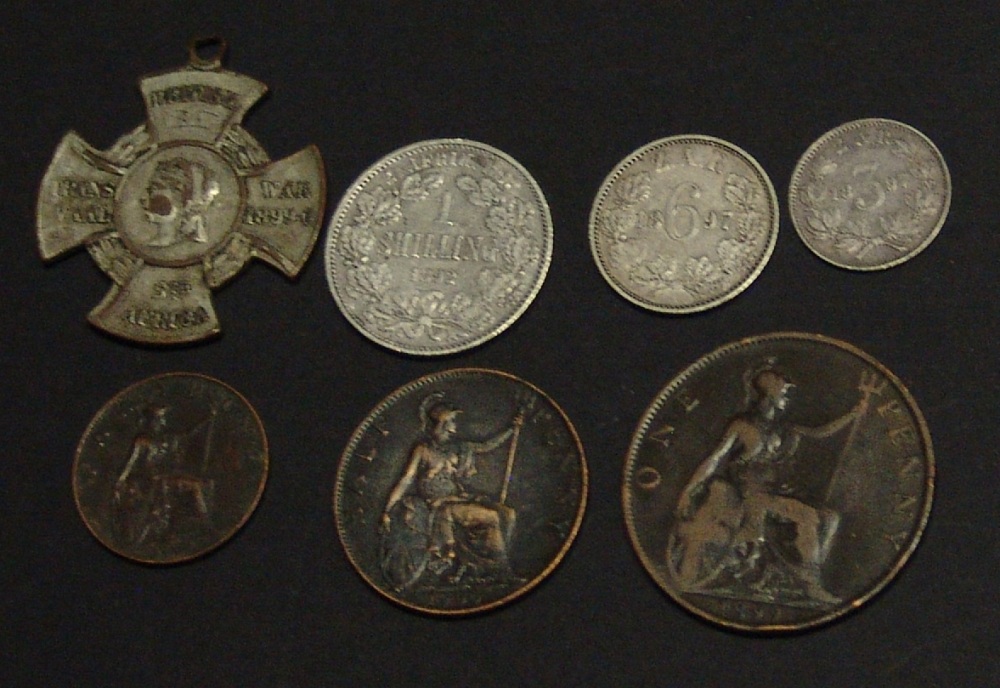 | Boer War Coinage & Medalet. Includes
South Africa silver 1897 3d & 6d plus 1892 shilling, GB 1899 penny,
1900 Halfpenny, 1901 Farthing, plus South Australia Boer War Peace
Medalet. 7 items in group. | $50 |
  | GB
1905 Nelson Token. 100th
Anniversary of Trafalgar. 18mm. Made from original copper from HMS
Victory, something usually in stock, VF or better, similar to photos. | Sold |
  | 1913 HMAS Australia medalet. Bronze, 29mm. Carlisle 1913/5. To Commemorate the Visit of the First
Commonwealth
Fleet to Sydney, near as struck.
The
battlecruiser Australia, superior to any other European warship then in
the Pacific, made her first appearance in Sydney harbour in 1913 at the
head of the Australian fleet. At the outbreak of war in 1914 she
provided a clear deterrent to enemy warships and helped keep our
coastline, shipping & trade open, whilst also taking part in
operations to sieze German colonies & destroy their communications
in the Pacific. In 1915 she was ordered to Britain where she became the
flagship of the 2nd Battlecruiser Squadron operating in the North Sea.
She returned home in 1919 and was scuttled in 1924 under the terms
of the Washington Naval Treaty. This
medalet marked the beginning of the Royal Australian Navy. The ships
entered the harbour int he following order: Australia, Melbourne,
Encounter, Sydney, Warrego, Paramatta & Yarra as crowds gathered in
the early morning to cheer their entry into Sydney Harbour. Marking the
occasion, all schoolchildren in NSW were given a holiday and issued
with a small commemorative medalet. | $35 |
 | Australia
WW1 1914 Emden
Medal. Western
Australian Sydney/Emden medal 1914, 32mm in silver by Wittenbach (C1914/9) a
medal presented by the people of WA to naval personnel serving on HMAS Sydney
during the battle, the reverse engraved "J.A.Harte/Able Seaman" gVF and very
scarce. | $2500 |
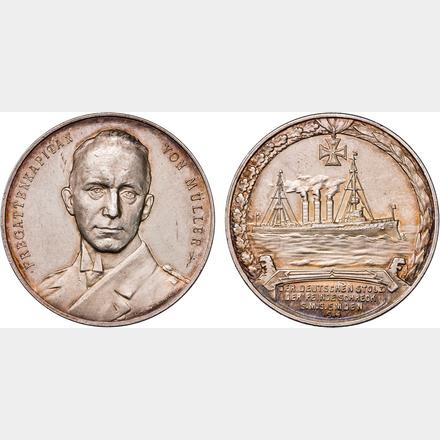 | Germany WW1 1914 Emden Medal. Von
Muller Medal 1914, 33mm in silver by L.Lauer of Nuremburg (MH430b,
Zetzmann 4051) gEF with mirrorlike fields. The Germans made a number of
different medals celebrating the voyage of the Emden. | $495 |

 | Germany WW1 1914 Emden Canteen token.
50
Pfenig, brass, 25mm, VF. Recovered from the wreck of the Emden, sunk by
HMAS Sydney in 1914. A real part of our early naval history. | $325 |
 | Australia WWI medallion 51mm in bronze by Stokes & Sons edge impressed
"Australian Comforts Fund S.A Division" (CZN/1) EF with underlying
lustre and scarce, particularly in this grade. | $165 |

 | WW1 Australian Singles:
BWM awarded to 11606 PTE H.E.CLARKE. A.S.C. A.I.F some spotty obverse toning. Also entitled to Victory Medal. Available at $100
Victory Medal awarded to 5030 PTE J.V.AHTON, 13 BN. A.I.F. With ribbon, VF. Also entitled to BWM.
Sold | $100
|
  | WW1 Australian Medal:
1914-15 star awarded to O.N.3 S.ADAMS. Stoker. Medal ribbon originally
attached to backing board. Also entitled to British War Medal and
Victory medal. | $100 |

 | WW1 Australian Medal Pair: 1914-15 Star; Victory Medal 1914-19. 6015 Pte J.A.F.Ratcliffe. 2
G.Hosp. A.I.F. on first medal, 6015 L-Cpl J.A.F.Ratcliffe. 2 A.G.H.
A.I.F. on second medal. Both medals impressed. first medal
with some dark toned areas, otherwise fine - good fine. Also entitled to BWM, which is out there, somewhere.. James Albert
Fitzroy Ratcliffe, motor mechanic, age 20, born at North Brisbane, Qld;
Enl.20Jul1915 at Brisbane, Qld, with 2 years service in Senior Cadets
and 2 years in AAMC CMF; Emb.16Aug1915; TOS 2AGA; to AMTS 01Oct1915; to
2AGH 26Mar1916; to L/Cpl 14Dec1916, France; TOS 1DSC 17Jan1917; to
hospital with VD 02Jul-08Aug1917; TOS 1ADMT Coy 12Mar1918; to Cpl
14Jan1919; RTA 20May1919; Disch.04Sep1919. With part copy of Service
File. | $195 |
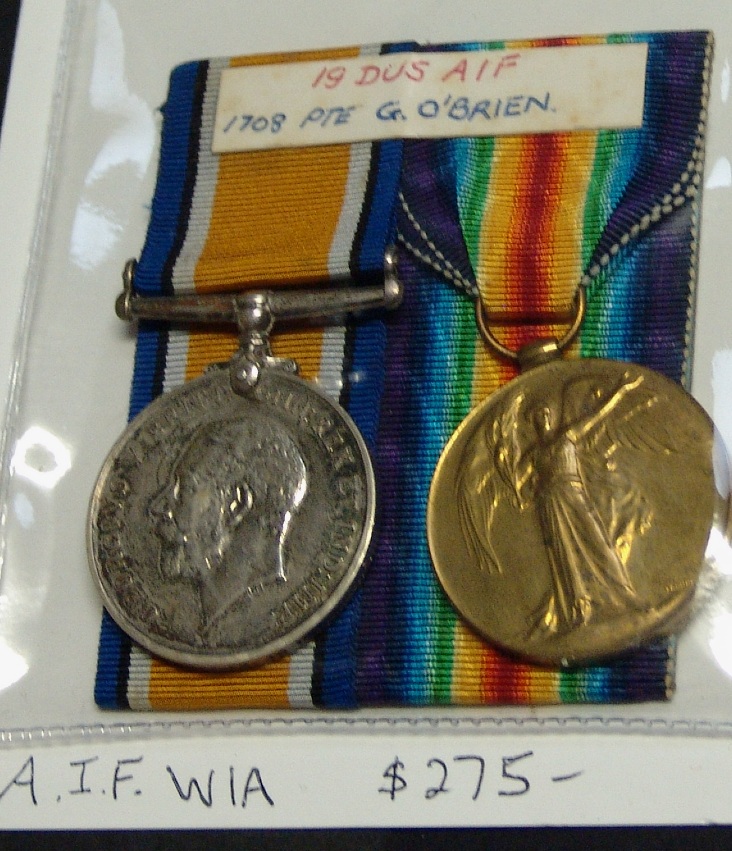 | WW1 Australian Pair to Wounded In Action. British War Medal 1914-18; Victory Medal 1914-19. 1708 Pte.
G.O'Brien. 19 D.U.S. A.I.F. Both medals impressed, display mounted, some spotting toning, VF.
George O'Brien, stockman, age 35,
born at Clare, Sth aust; Enl.24Jan1916 at Charters Towers, Qld;
Emb.20Apr1916; TOS ASC 13Jul1916; to France 25Jul1916; TOS 19 DUS (Depot
Unit Supply) 18Sep1916; trf to 12Bn 29Dec1916; TOS 1 ADBD 30Dec1916;
rtn to 12Bn 17Jan1917; WIA 26Feb1917 GSW left knee, France; RTA
03Jul1917; Disch.09Nov1917 Medically Unfit. | $275 |

 | WWI Australian Trio:
1914-15 Star; British War Medal 1914-18; Victory Medal 1914-19.
1076 Pte A.McDonald. 6/A.S.C. A.I.F. on first medal, 1076 L-Cpl A
McDonald. 6 A.S.C. A.I.F. on the other medals. All medals impressed, toned, Very Fine.
Allan
McDonald, draper and jackeroo, age 23, born at Dubbo, NSW;
Enl.27Sep1914 at Marrickville, Sydney, NSW, with previous service of 12
months with Light Horse in New Zealand; to driver 18Dec1914;
Emb.21Dec1914; TOS 6AASC 13Nov1915 at Gallipoli; TOS 2LHB 26Mar1916 at
Serapeum; various hospitalisations including with syphilis; RTA
21Nov1916; Disch.07Feb1917 Medically Unfit. | $450 |
  | GB.
1916 Battle of Jutland medal. White
metal, 45mm. "Glorious Memory of those who fell that day" with Union
Jack and White Ensign. Minor marks, Extremely Fine and scarce. | $125 |
| Between the Wars, circa 1920-1938. | $ |
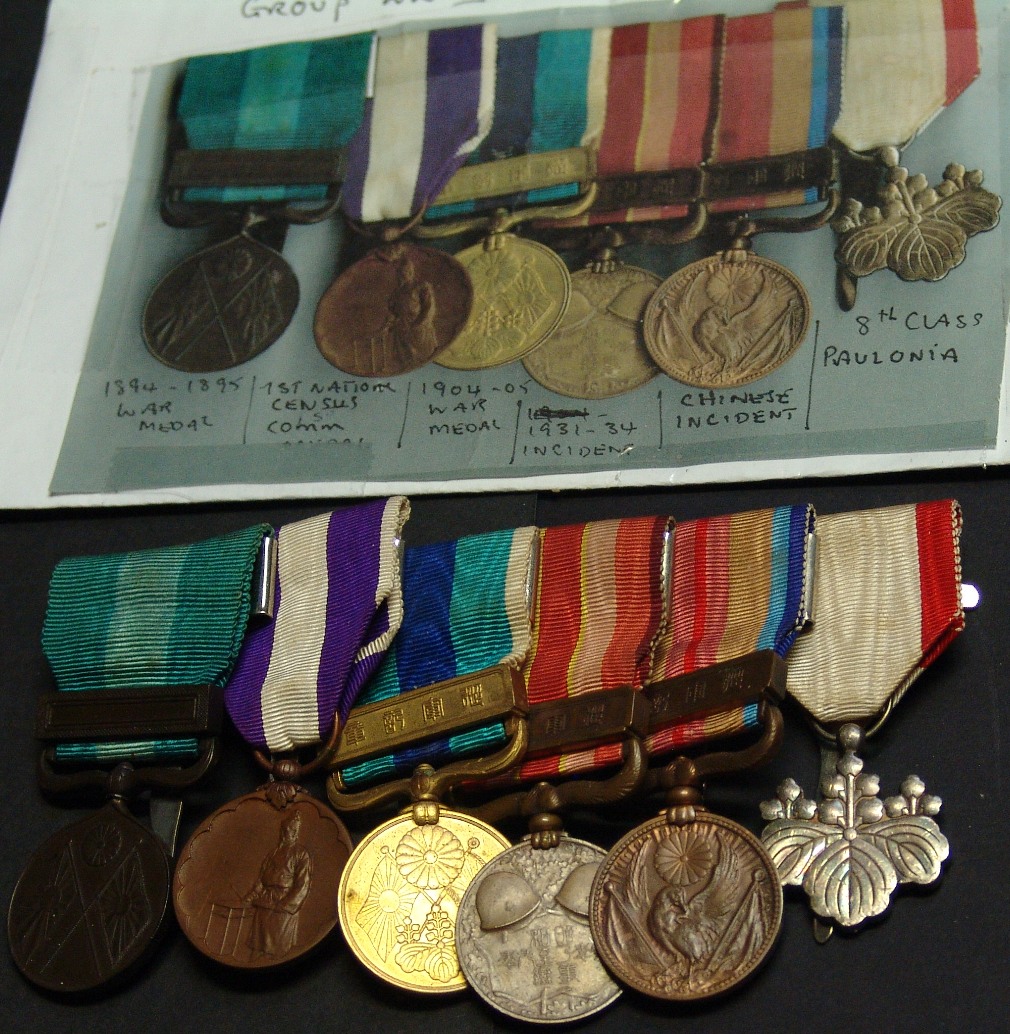
 | Japanese military medal group.
Includes 1894-95 China War, 1904-05 Russia War medal, 1931-34 Incident,
China Incident, 1st National Census and 8th Class Paulonia. A very nice
group of original Japanese military medals. Ex Tom Kiernan collection. | $375 |

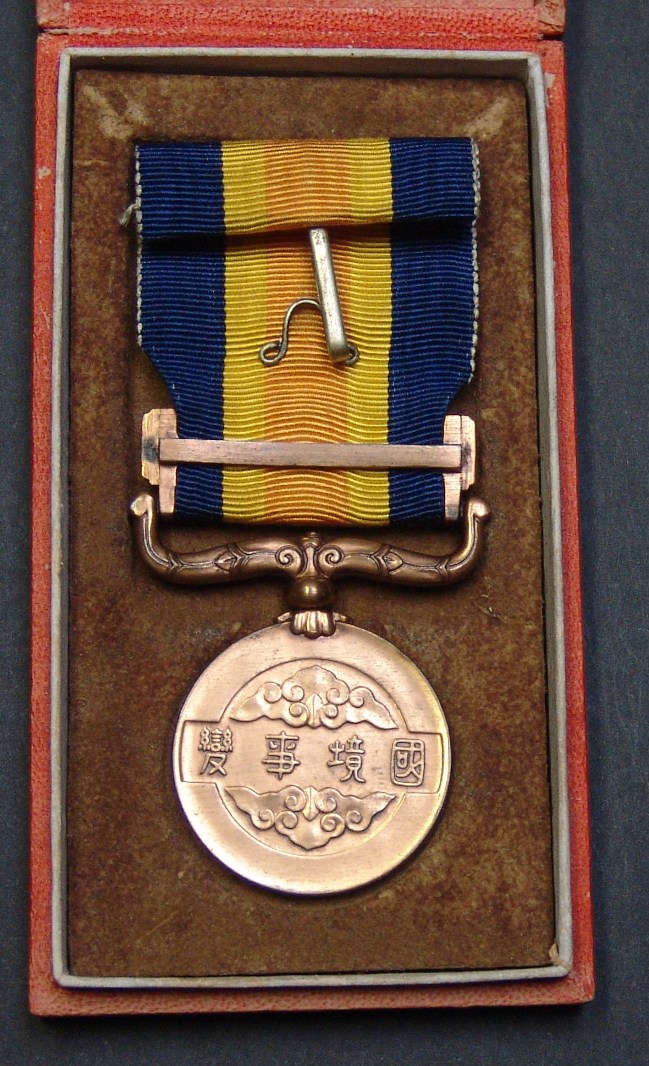
 | Japan. 1939-1940 Nomonhan Incident Military medal. In original box, overall attractive condition and scarce.
This
brutal undeclared border war between Russia and Japan left the Japanese with a
bloody nose, especially after the battle of Khalkin Gol in 1939 where
they suffered approximately 18,000 casualties. The Nomonhan
Incident had important repercussions for world history, as the Japanese
decided the Russians were too formidable, especially in tanks, and
turned their attentions southward to the Pacific, with dire
consequences for millions of people. Ex Tom Kiernan collection. | $275 |
 | BRITISH KGV Period POLICE MEDAL. Harry A Moat. gVF, with ribbon. | $35 |
|
Click small photo to see larger photo.
|
World
War 2 & later items.
|
$ |
| Nazi Germany 1933 to 1945. | |
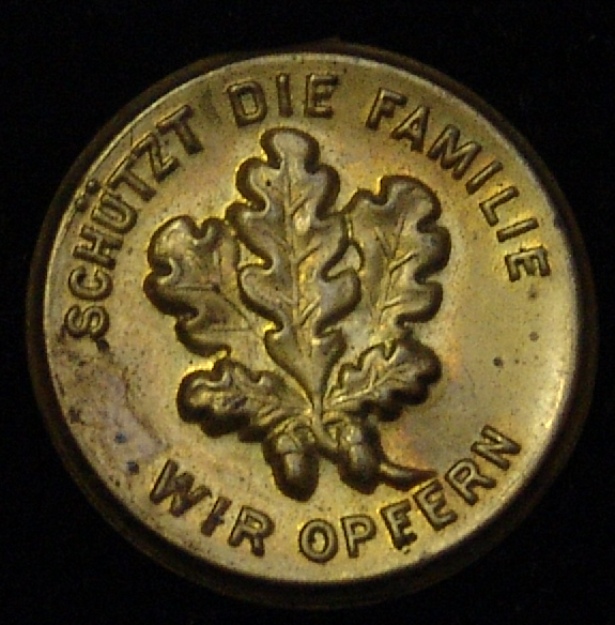
| Nazi badge - c1933, 25mm, tin. Schutzt Die Famille (Protects the Family) Very Fine. | $25 |

| Nazi badge - 1933, 26mm, tin. Very Fine. | $25 |

| Nazi badge - 1933 Turnfest (Sports Festival) 33mm, silvered base metal. Much of the original silvered finish remains. | $35 |

| Nazi badge - 1933-34 Fruhungsfahrt Nach Eisenach
Ddag Gau Thuringen, aluminium, 38mm x 46mm, VF. | $25 |

| Nazi badge - 1935 SAAR re-unified with Germany, 37mm, tin, with rear pin, VF. | $35 |

| 1930s Nazi badge - RLB Luftschutz Tut Not, zinc, 33mm x 24mm, VF. | $35 |

| 1930s Nazi badge - 30mm, zinc, gVF. | $25 |

| Nazi badge - 1936 Freedom & Bread, 28mm, tin. Very Fine, similar to photo. | $20 |

| Nazi badge - 1937, Aachen, 28mm x 38mm, tin, VF. | $35 |

| Nazi badge - 1939, tin, 23mm, Sports Festival, VF. | $25 |


| Nazi Germany, WWII original wound badge - 45mm x 38mm, Very Fine. | $95 |
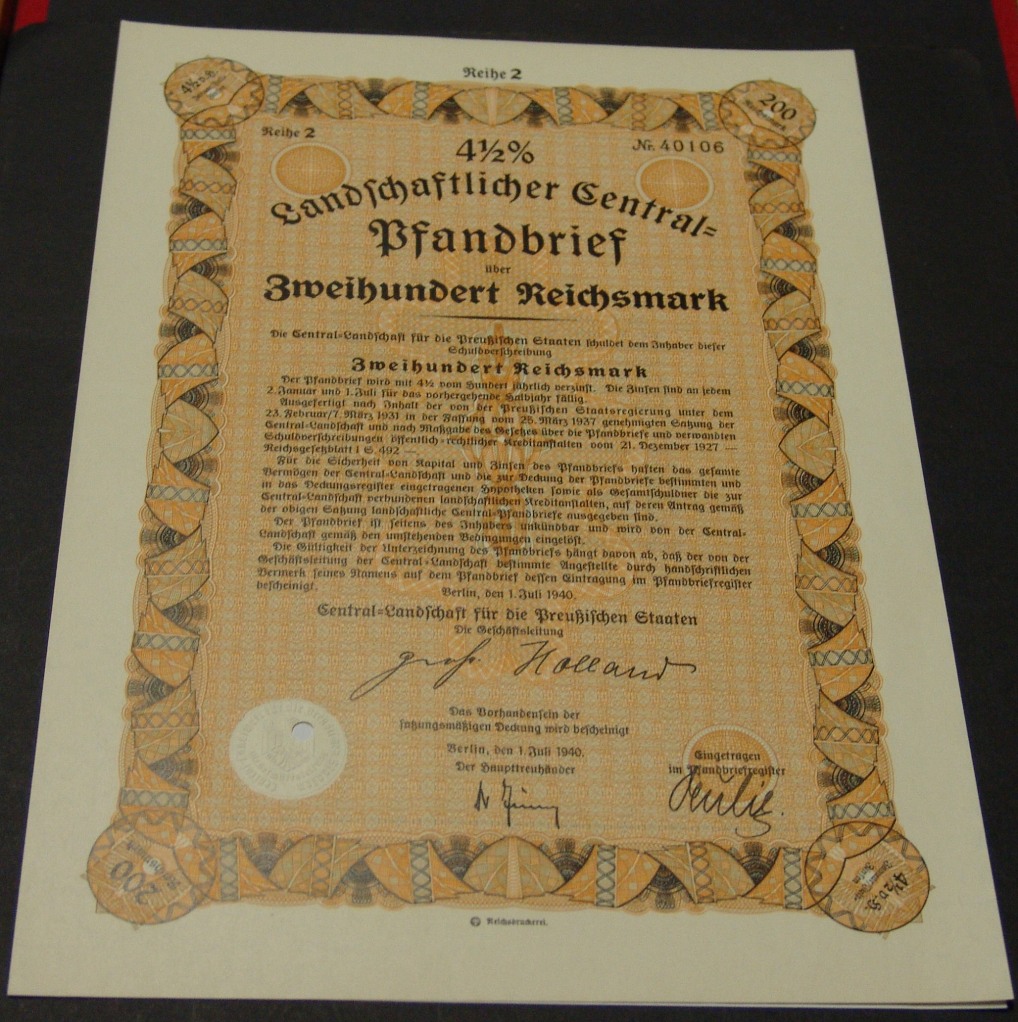 
 | Nazi Germany WW2. War Bonds, A4 size, colourful, original, three different to choose from, $20 each. | $20 ea |
|
Click small photo to see larger photo.
|
GB/Commonwealth Medals &
Militaria, WW2, most are originals unless noted in the description.
|
$ |
Part
of
the
song
"Dust"
By
Redgum | My brother played the
ponies,
a breaker by his trade.
Sailed for Cairo in '41,
with the 3rd Light Horse
Brigade.
Rode the winds of
fortune,
cast his life in a two-up
game.
I carry his coins, they
were in his hat,
from Tobruk to El Alemain.
His bones lie out at
Sandgate,
where the waste creeks
meet the sea. There's gutted cars and
salvage yards,
where Brumbies once ran
free. | $ |
  | WW2 Original Italy star. Named to an Australian, 232713 L.W.HENNINGS. Decent condition, with ribbon. | $45 |
|

|
GB/Australia. WW2 1939-45 Original Medal,
a few minor marks, un-named, with
ribbon, similar to photo. |
$35 |
  | GB/Australia.
WW2 Defence Medal,
a few minor marks, with
ribbon, un-named, similar to photos. | $40 |
|

|
GB/Australia.
WW2 Original 1939-45 star. Un-named, similar to photos. |
$35 |
 | GB./Australia.
WW2 Original Africa star. With ribbon, un-named, similar to photo. | $35 |
 | GB.
WW2 Original Italy star. Decent condition, with ribbon, un-named, similar to photo. | Sold |
 | GB/Australia.
WW2 Original France & Germany star. Original medal with fresh ribbon. | Sold |
 | GB/Australia.
WW2 Original Burma star. Decent condition, with ribbon, similar to photo. | $35 |
 | GB/Australia.
WW2 Original Pacific star. Decent condition, with ribbon, similar to photos. | Sold |

| GB/Australia.
WW2 service, Arctic Star miniature.
This
medal was announced in 2013 and these are similar to
those produced for eligible veterans. New condition, with ribbon. | $15 |
|

|
WW2
AIR CREW EUROPE. Modern Copy of a scarce award, original worth $100s.
|
$30 |

 | GB.
WW2 period original Naval reserve Long Service Medal.
Silver, 35mm diameter. Name
erased. Complete with ribbon, toned, scarce. | $75 |

| GB. WW2 Long Range
Desert Group badge. 32mm.
Modern copy, original very scarce. | $15 |

 | Australian WW2 "Short Snorters". Australian
10s and pound 1942 banknotes signed by Allied personnel in the Pacific
during WW2. Plus Bermuda 5s note from the period Circulated grades, the
10s with some tape repairs. Three notes in group. Per photos. | $95 |
 | Australian
WW2 One Pound War Savings Certificate. gVF or better and an interesting souvenir from the period, similar to photo. | $50 |

| New
Zealand WW2. New
Zealand Armoured Corps Badge, approx 40mm. Excellent condition
and scarce, similar to photo. | $30 |
 | Australia Petrol Ration ticket. 1940 One Gallon, used. | $10 |
 | Australia Petrol Ration ticket. 1941 One Gallon, used. | $10 |
 | Australia Petrol Ration ticket. 1941 One Gallon, unused. | $10 |
 | Australia Petrol Ration ticket. 1942 One Gallon, used. | $10 |
 | Australia Petrol Ration ticket. 1943 One Gallon, unused. | $10 |
 | Australia 1940 Petrol Ration ticket. Two Gallons, unused. | $10 |
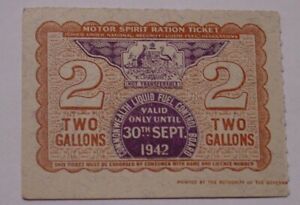 | Australia 1942 Petrol Ration ticket. Two Gallons, unused. | $15 |
 | Australia Petrol Ration ticket. 1940-1941 Five Gallons, used. | $15 |

 | Australia Petrol Ration ticket. 1941 Five Gallons, used. | $15 |
 | NSW Petrol Ration ticket. Valid until 31 July 1949. One Gallon, unused. | $10 |
 | NSW Petrol Ration ticket. Series A. Five Gallon, unused. Similar to photo. | $15 |
 | South Australia Petrol Ration ticket. One Gallon, used. | $7.50 |
 | South Australia Petrol Ration ticket. Two Gallons, unused. | $10 |

 | South Australia Petrol Ration ticket. Five Gallons, used. | $15 |

 | South Australia Petrol Ration ticket. Ten Gallons, used. | $20 |
 | Tasmania Petrol Ration ticket. Exp 31 July 1949 One Gallon, unused, scarcer. | $20 |
 | Tasmania Petrol Ration ticket. Exp 31 July 1949 Two Gallon, unused, creases, but scarce. | $15 |

 | Australia Petrol Ration ticket. 1946 One Gallon, used, similar to photo. | $9 |
 | Australia Petrol Ration ticket. Expiry 31 DEC 1946 One Gallon, unused. | $10 |
 | Australia Petrol Ration ticket. 1946 Two Gallons, unused, similar to photos. | $10 |
 | Australia Petrol Ration ticket. 1947 One Gallon, unused. | $10 |
 | Australia Petrol Ration ticket. 1947 One Gallon, unused. | $10 |
 | Australia Petrol Ration ticket. 1947 One Gallon, unused. | $10 |
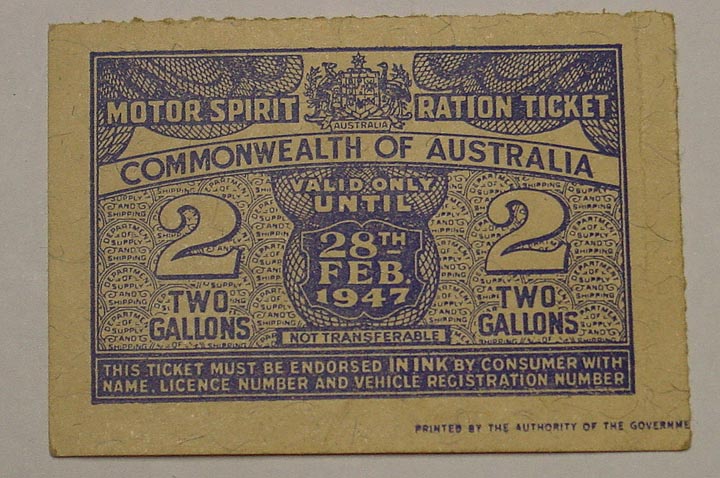 | Australia Petrol Ration ticket. 1947 (Feb) Two Gallon, unused. | $10 |
 | Australia Petrol Ration ticket. Exp 1948 (31 July) Five Gallon, unused, small marks. | $15 |
 | South Australia Petrol Ration ticket. 1949 One Gallon, unused. | $10 |
 | South Australia Petrol Ration ticket. 1949 Two Gallon, unused. | $10 |

| Interesting
Bits and Pieces.
Old Australian
badges, etc, mostly 1930s-1960s period, incl Miniature WW1
Service medal, Comforts Fund badges, War Veterans Home Appeal, KGVI
Lapel badge, 5 KA smilers Club, Dog House club, etc. Approx 30
items, many military related. | $50 |
|

|
Book
- Propaganda Postcards of WW2. By Ron Menchine, Krause Publication, 2000. Softback, over
150 pages. Describes 100's of postcards, from USA, Britain,
Germany etc, many priced, profuse illustrations.
|
$15 |

| Nigeria. 1966-70 National Service medal. Un-named, with ribbon, near as made. | $15 |

| Nigeria. 1967 Defence Service medal. Un-named, with ribbon, near as made. | $15 |





Guy D'Oyly-Hughes
original autograph 1929 - $200.
 | The Tragedy of HMS Glorious, June 8th 1940.
HMS Glorious, Acasta & Ardent.
I preface these comments
by saying that hindsight is a wonderful thing and it is easy for us
armchair strategists, for whom these brave men died to give us the
lifestyle we currently enjoy, to fight the battle on Monday morning, or
after the event.
Guy D'Oyly-Hughes (1891-1940) was a brave man who served on submarines in WW1 and won two gallantry awards.
However,
a combination of shocking errors by himself and British intelligence
led to one of the greatest naval disasters in loss of life terms
suffered by Britain in WW2 and is a compelling story of human folly and
human courage.
The aircraft carrier HMS Glorious and the two
destroyers were despatched ahead of the Narvik evacuation convoy so the
captain of HMS Glorious, Guy D'Oyly-Hughes could expedite a court
martial against one of his officers, a ridiculously trivial reason for
such a tactically important decision.
The carrier failed to have
any aerial reconissance or a proper lookout posted and was in a poor
state of readiness when it was surprised and sunk by the German
battle-cruisers Scharnhorst & Gneisneau in the Arctic Sea on June
8th 1940.
Although the British sighted the Germans at 1600
GMT, by 1638 when the first German shell struck the Glorious, she still
had not managed to get any aircraft aloft, a very poor level of
organization.
Over 1500 men died in these three ships, which were all lost to German gunfire. The few survivors were not found for nearly three days, during which most had died from the cold & exposure.
This
tragic incident was largely covered up by the Admiralty, indeed, 70+
years after the events, some official records about this battle are
still suppressed.
As
astounding as the folly that led to this disaster was the bravery of
the survivors and especially of the two destroyers, who, even though
they knew they were doomed, attacked and damaged the German
battle-cruiser Scharnhorst to such an extent that the Germans had to
return to port, thus in all probability saving the King of Norway,
who was aboard another ship (HMS Devonshire) which was right in the
Germans path.
The
actions of those aboard HMS Acasta and HMS Ardent have, in my opinion,
not been fully recognised by the British; some posthumus bravery
awards are in dire need of distribution.
For all its horror and carnage, World War II was a just war, if such a thing is possible. British, Australians & Americans, the democratic English speaking
peoples, stood up and defeated murderous, tyrannical dictatorships
that, given the chance, would have enslaved the whole world. Lest we
forget.
The stately ship is seen no more,
The fragile skiff attains the shore;
And while the great and wise decay.
And all their trophies pass away,
Some sudden thought, some careless rhyme.
Still floats above the wrecks of Time.
(William Lecky 1838-1903, On an Old Song.)
Further reading: Roskill, Stephen. "The Cantankerous Captain of HMS Glorious" Sunday Times 1980.
Winton, John. "Carrier Glorious." Cassell Military paperbacks, 1986.
BBC Channel 4 Documentary, HMS Glorious, 1997.
| Original
1929
Guy
D'oyly
Hughes
auto-
graph
$200 |

 | Australian HMAS Sydney 1940 Bartolomeo Colleoni Medal.
In
Oxidized silver, 57mm, Carlisle 1940/2 by Amor. Obverse: HMAS Sydney
advancing at full speed, with smoking and disabled Italian cruiser
Bartolomeo Colleoni in background. Reverse: A representation of the
plaque presented by the City of Sydney to HMAS Sydney. Name on edge
erased, otherwise Very Fine and scarce. | Sold |
|



This plastic model of HMAS Sydney
is to scale, 1 inch = 50 foot and is nearly one foot (12'')
long.
It shows the Sydney as she appeared
in 1939, with 8 x 6 inch guns, 4 x 4 inch AA guns, 12 x .5 inch
machine guns, eight 21 inch torpedo tubes, three searchlights,
pole masts, fire control directors, ship's boats, carley
floats, crane, catapult and one Seagull Mk V seaplane.
This scale model has been built by
me from parts from several different 1/600th Airfix model
kits...
No commercially produced 1/600 scale model kit
of HMAS Sydney has ever been offered for sale...



Above:
Only physical evidence so far found of HMAS Sydney, a
damaged Carley float.

Above-wartime photo of
the Sydney, below is
a peactime photo.

Below is a line
drawing of the Sydney design, minus the aircraft & catapult.


Above: The Kormoran.
|
What
happened to HMAS Sydney?
HMAS
Sydney, the
second Australian cruiser to be so named, was a "Modified
Leander" class cruiser. She was originally named HMS
Phaeton, but transferred on completion to the RAN in the mid
1930's and re-named HMAS
Sydney.
She
differed from the Leander class in being fitted with unit
machinery. This meant that she had two funnels instead of one.
Unit machinery was fitted to separate the boiler rooms, so the
ship could not be completely disabled by any single hit.
The two funnels also gave the ship a remarkably handsome,
symmetrical appearance. Australia had three modified
"Leander" class cruisers. Two, Sydney
&
Perth,
were
sunk during World War II with very heavy loss of life..
HMAS
Sydney was
555 feet long, with a beam of 56.8 feet. She weighed over 7000
tons fully loaded, but was still very fast, and could make 32
knots (about 60 kilometers per hour). Her main armament
consisted of eight six-inch (152mm) guns. She also carried four
single 4 inch (100mm) 12 x 0.5 inch anti-aircraft guns, torpedo
tubes and a seaplane. Her range was about 6000 miles and
she was designed to scout for the the fleet and protect
convoys.
HMAS
Sydney had
a short but busy and distinguished service career, the highlight
being the sinking of the Italian cruiser Bartolomeo
Colleoni
in
the Mediterranean in 1940. However, on November 19, 1941,
she was ambushed and sunk by the German raider
Kormoran,
in
the Indian Ocean about 150 miles off Western Australia.
Sydney's
captain,
Joseph Burnett, had taken command of the cruiser in May,
1941. He was considered an officer of great experience and
professional achievement. However, Burnett fatally erred
by approaching an unknown ship too closely on November 19, 1941,
in an area where it was known German raiders were operating.
Why
Burnett waited to get within about 1500 yard (point-blank in
naval terms) before asking for the other ship's secret call
sign, a ship that was NOT listed on his plot, remains a mystery, as all 645 officers and men went down
with the Sydney.
Why
also, did Burnett not send his scouting aircraft to inspect the
ship from a safe distance, particularly as she was giving
garbled replies to his messages? Also, Sydney
was
not properly "closed up" ready for action. True, her
six inch turrents were manned, but most of her light guns were
not and the Germans could see many men lounging about on the
cruiser's deck. The most charitable thing one can say for
Burnett was that he was totally fooled by the German's
disguise...In his defence, Kormoran
bore
a remarkable similarity to the ship she claimed to be, the Dutch
merchant ship Straat
Malakka and
HMAS Sydney had experienced false raider sitings previously, also, it is easy to fight the battle on Monday morning, or in
hindsight.
The
German raider could not reply to Sydney's
request
for Straat
Malakka's
secret
call sign, and her confusing messages had done their job of
enticing the Australian ship in to point blank range.
Kormoran
hoisted
her German Navy colours and opened fire at close range. A hail
of 5.9 inch and 37mm fire swept the Australian ship, killing
many men and putting the bridge and fire control out of action.
Due to damaged fire-control systems, most of Sydney's
return
gunfire missed the German raider, but hits were scored and the
Kormoran's
engine
room set afire.
The
ships drifted out of range after about 30 minutes of hectic
action. Both were mortally wounded. The Kormoran's
fire
fighting gear had been destroyed
so
the crew had no choice but to abandon ship before the fire
reached the ship's store of mines, which blew her apart.
They set to the boats, over 300 were later rescued. The Sydney
was
never seen again. She had sustained devastating damage,
much worse than Kormoran,
and
it is safe to assume that she sunk during the late evening of
the 19th November 1941. The only piece of HMAS
Sydney ever
recovered was a badly damaged Carley float, found eight days
after the action and now on display in the Australian War Museum
in Canberra..
Since
that fateful day, many mysteries remain unanswered, and some
people have tried to suggest a Japanese submarine was involved
in the final disappearance of HMAS
Sydney
or some of her
crew.. The
evidence to support this is flimsy. The cruiser had
taken numerous large calibre shell hits and at least one torpedo
hit in the action. It is doubtful she survived long after the
Kormoran
lost
sight of her, about 10 pm. All her boats and
rafts had almost certainly been smashed from the amount of
gunfire she had received. Japan, although nearly ready for war,
had not attacked yet. Her carrier forces were soon to strike
Pearl Harbour in a surprise attack, so why potentially ruin that
by attacking a single ship, or risk discovery, 18 days before?
HMAS
Sydney was
a victim of the fortunes of war, and unfortunately it appears,
to incompetent leadership. She was a more powerful and faster
ship than her final adversary, but the Kormoran
had
the vital element of surprise. Both ships
remain
forever off the WA coast, a silent memorial to 725 brave
men, both Australian and German, who gave their lives in
service of their country. Lest we forget.
|
|
|
|
|
|